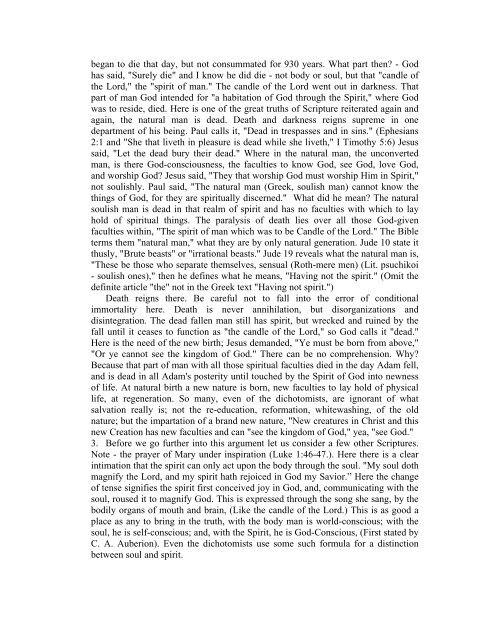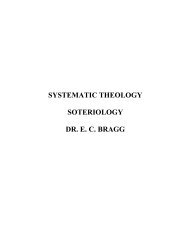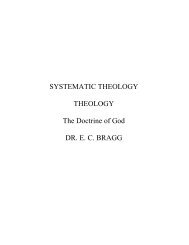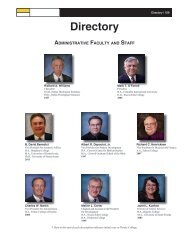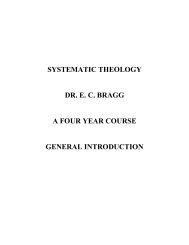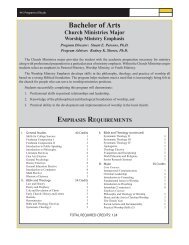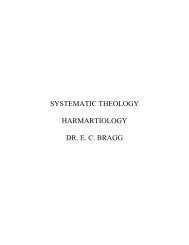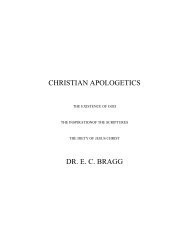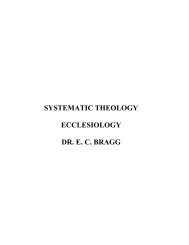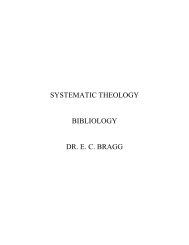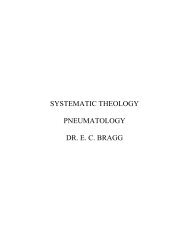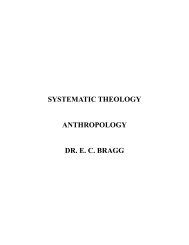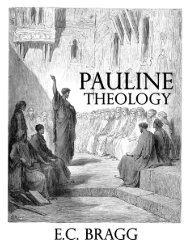CHRISTIAN PSYCHOLOGY DR. E. C. BRAGG - Trinity College
CHRISTIAN PSYCHOLOGY DR. E. C. BRAGG - Trinity College
CHRISTIAN PSYCHOLOGY DR. E. C. BRAGG - Trinity College
You also want an ePaper? Increase the reach of your titles
YUMPU automatically turns print PDFs into web optimized ePapers that Google loves.
egan to die that day, but not consummated for 930 years. What part then? - God<br />
has said, "Surely die" and I know he did die - not body or soul, but that "candle of<br />
the Lord," the "spirit of man." The candle of the Lord went out in darkness. That<br />
part of man God intended for "a habitation of God through the Spirit," where God<br />
was to reside, died. Here is one of the great truths of Scripture reiterated again and<br />
again, the natural man is dead. Death and darkness reigns supreme in one<br />
department of his being. Paul calls it, "Dead in trespasses and in sins." (Ephesians<br />
2:1 and "She that liveth in pleasure is dead while she liveth," I Timothy 5:6) Jesus<br />
said, "Let the dead bury their dead." Where in the natural man, the unconverted<br />
man, is there God-consciousness, the faculties to know God, see God, love God,<br />
and worship God? Jesus said, "They that worship God must worship Him in Spirit,"<br />
not soulishly. Paul said, "The natural man (Greek, soulish man) cannot know the<br />
things of God, for they are spiritually discerned." What did he mean? The natural<br />
soulish man is dead in that realm of spirit and has no faculties with which to lay<br />
hold of spiritual things. The paralysis of death lies over all those God-given<br />
faculties within, "The spirit of man which was to be Candle of the Lord." The Bible<br />
terms them "natural man," what they are by only natural generation. Jude 10 state it<br />
thusly, "Brute beasts" or "irrational beasts." Jude 19 reveals what the natural man is,<br />
"These be those who separate themselves, sensual (Roth-mere men) (Lit. psuchikoi<br />
- soulish ones)," then he defines what he means, "Having not the spirit." (Omit the<br />
definite article "the" not in the Greek text "Having not spirit.")<br />
Death reigns there. Be careful not to fall into the error of conditional<br />
immortality here. Death is never annihilation, but disorganizations and<br />
disintegration. The dead fallen man still has spirit, but wrecked and ruined by the<br />
fall until it ceases to function as "the candle of the Lord," so God calls it "dead."<br />
Here is the need of the new birth; Jesus demanded, "Ye must be born from above,"<br />
"Or ye cannot see the kingdom of God." There can be no comprehension. Why?<br />
Because that part of man with all those spiritual faculties died in the day Adam fell,<br />
and is dead in all Adam's posterity until touched by the Spirit of God into newness<br />
of life. At natural birth a new nature is born, new faculties to lay hold of physical<br />
life, at regeneration. So many, even of the dichotomists, are ignorant of what<br />
salvation really is; not the re-education, reformation, whitewashing, of the old<br />
nature; but the impartation of a brand new nature, "New creatures in Christ and this<br />
new Creation has new faculties and can "see the kingdom of God," yea, "see God."<br />
3. Before we go further into this argument let us consider a few other Scriptures.<br />
Note - the prayer of Mary under inspiration (Luke 1:46-47.). Here there is a clear<br />
intimation that the spirit can only act upon the body through the soul. "My soul doth<br />
magnify the Lord, and my spirit hath rejoiced in God my Savior.” Here the change<br />
of tense signifies the spirit first conceived joy in God, and, communicating with the<br />
soul, roused it to magnify God. This is expressed through the song she sang, by the<br />
bodily organs of mouth and brain, (Like the candle of the Lord.) This is as good a<br />
place as any to bring in the truth, with the body man is world-conscious; with the<br />
soul, he is self-conscious; and, with the Spirit, he is God-Conscious, (First stated by<br />
C. A. Auberion). Even the dichotomists use some such formula for a distinction<br />
between soul and spirit.


